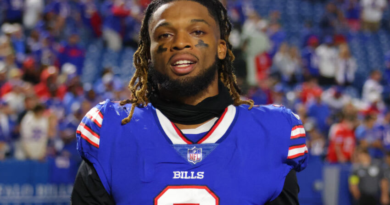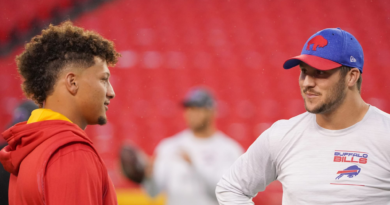Mat Ishbia's Suns are all-in on 2024 — because they have to be
MAT ISHBIA SAYS he’s never had a cup of coffee. He doesn’t need caffeine, or an alarm clock.
On Tuesday, he’d been up and going since 3:30 a.m. His Phoenix Suns were a disappointing 35-26, ravaged by injuries and inconsistency, and preparing for the NBA to formally award the franchise the 2027 All-Star Game. His Phoenix Mercury were in the middle of executing a $100 million plan to build a 123,000-square-foot training facility. And he was still running a multibillion mortgage company, United Wholesale Mortgage, and leading 6,000 employees.
He also had not one, but two basketball games to watch that night. The first was a youth game he was coaching. The second was the Suns’ thrilling 117-107 overtime victory over the Denver Nuggets, their best win of the season — and one, for the moment, that kept them in sixth place in the Western Conference standings and out of the play-in tournament.
“I’ll do whatever it takes to win,” Ishbia says during a wide-ranging interview with ESPN to discuss his first year at the helm of the Suns and Mercury. “If we’ve got to go over the second apron on [the youth] team, too. We’ll go over the second apron.”
He’s joking … sort of.
“I tell my kids — they’re 9, 10 and 13 years old — ‘The goal is to have fun and get better at basketball or football or baseball, whatever I’m coaching. But it is always more fun when we win.’
The Suns are one of five teams over the so-called “second apron” ($182.5 million of the NBA’s new collective bargaining agreement, which was meant to act as something of a hard cap to discourage uber-rich owners from spending their way to a championship).
The LA Clippers, Golden State Warriors, Boston Celtics and Milwaukee Bucks are the other teams over the second apron this year. Each of them has indicated a preference to get below that threshold for next season rather than face the draconian penalties to which second-apron teams are subjected.
Ishbia and the Suns are doing the opposite, and he says they’ll do it again despite the uneven return on the investment Ishbia and his ownership group have made into this season’s team. Phoenix traded most of its future draft capital — the team doesn’t own or control a first-round pick until 2031 — and depth for Kevin Durant and Bradley Beal in Ishbia’s first five months at the helm. He’s committed to paying some $67 million in luxury taxes for a team that has teetered on the fringe of the Western Conference playoff-picture because of a series of injuries to their three stars.
“I understand all the rules that come with the second apron. I understand exactly what the CBA tried to do,” he says. “I read it, I know it inside and out, and we made a calculated decision that we think the team with the best players wins. Would I rather have Brad Beal, Kevin Durant and Devin Booker than just having two of those guys? I’d rather have all three a hundred times out of a hundred, and I don’t think there’s another GM or owner or CEO that wouldn’t say that exact same thing.
“So now how do you maneuver around that? Well, you have to differentiate yourself. … I have to create an environment where [we’re] trying to be the best franchise in sports where the players want to come play.”
IN THE YEAR since he paid $4 billion to disgraced owner Robert Sarver for the Suns and Mercury, Ishbia says he has been focused on creating that environment. Whether it was greenlighting the trades for Durant, Beal and former WNBA Finals MVP Kahleah Copper, committing to the new practice facility for the Mercury, hiring Golden State Warriors executive Nick U’Ren to be the general manager of the Mercury, spearheading an ambitious plan to make Suns and Mercury broadcasts free to five times as many people on basic cable, or landing both the WNBA and NBA All-Star Games, Ishbia says everything must feed into the overarching goal he has set for his franchises.
“That’s what you’re supposed to do as an owner,” Durant told ESPN. “It’s about swinging for the fences every year.
“What else are you supposed to do? Sit back and hope that you get a draft pick that turns out to be Victor [Wembanyama]? No.”
And he’s committed to investing the same amount of energy into the Mercury as he is into the Suns.
“Every time he says Suns, he says Mercury,” U’Ren told ESPN. “It has just been awesome because there’s such a need for it on the women’s side, and there’s so much potential for growth and success with someone who cares like he does.”
The aggressive approach has earned Ishbia friends and foes in a short period of time. It could be argued that the Suns giving up local TV revenue to expand the viewing audience could hurt the leverage of other franchises in their broadcast rights negotiations. Or that building a new WNBA practice facility puts pressure on other franchises to do the same, even if they can’t afford to. Or that willfully blowing past the second apron every year thwarts the intention of the new CBA.
“I don’t think they’re worried about what I’m doing,” Ishbia says of other team owners. “I think that they like new people challenging what they’ve been doing. Maybe other teams won’t want to do the TV deal. … But I don’t work for the other NBA owners, I work for the fans of Phoenix. My job is to serve the Mercury and Suns fans.”
And he says he’s unconcerned with making back what he’s invested.
“I never use the term ROI [return on investment],” Ishbia says. “I don’t think like that. I think invest, do the right thing, build the business, try to be successful, try to win whether it’s mortgages or basketball. And you know what? Money always follows success. “No fan cares whether the owner makes money. He is a billionaire. How much did he make or lose in the luxury tax? They don’t care at all. They want me to do my best to help us win a championship.”
1:23
KD powers Suns to OT win over Jokic, Nuggets
Kevin Durant and Bradley Beal shine in overtime, leading the Suns to a big road win over the Nuggets.
ISHBIA IS RECKONING with the reality that the Suns haven’t won as much as expected this season — Caesars had their over/under win-total projection at 50.5 — as their three stars have missed a combined 48 games because of injury.
What if this investment doesn’t result in a playoff appearance, let alone a championship?
“If we don’t win this year … which is possible… then we’ll say, ‘OK, what can we do better to try to win next year? Do I need to adjust? Do we need to run different plays? Do we need different players? Do [we] change something? What do I do?” Ishbia says. “All I’m focused on is how do we win right now. I’m not thinking about what our 2031 draft [is] going to look like. I’m excited about the 2024 playoffs.”
While Ishbia isn’t thinking about anything beyond this postseason, a stark reality awaits the Suns if they’re unable to win a title. They’ll likely keep this year’s first-round pick — the two teams with swap rights on it are already in better draft position than Phoenix — but the new restrictions that kick in on second-apron teams will make it difficult for them from making any other significant changes to the roster. They won’t be able to take back more money in any trade than they send out. They won’t be able to make 2-for-1 or 3-for-1 deals to get another star to play alongside Durant, Booker and Beal. And they won’t have access to any free agency exceptions other than the veteran minimum.
For better or worse, they are committed to their current core for the next two seasons, after which Durant’s contract is up and Beal can become a free agent by declining his $57.1 million player option for 2026-27.
Booker, for his part, isn’t ready to consider anything beyond this season. “Everybody here is on the same page,” Booker told ESPN. “We’re in win-now mode. We want excellence. We know it’s not going to be easy. It’s a new team, but when you give up that much, we’re trying to win this year and years to come.”




